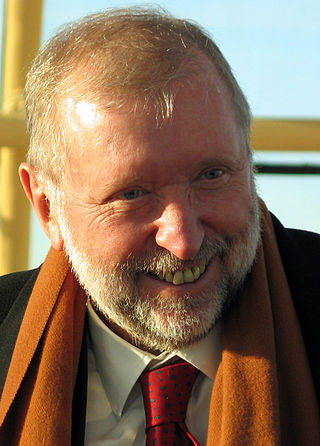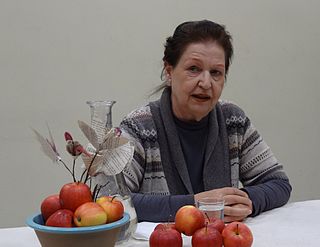Related Research Articles

Dimitrij Rupel is a Slovenian politician.

Ivan Cankar was a Slovene writer, playwright, essayist, poet, and political activist. Together with Oton Župančič, Dragotin Kette, and Josip Murn, he is considered as the beginner of modernism in Slovene literature. He is regarded as the greatest writer in Slovene, and has sometimes been compared to Franz Kafka and James Joyce.

Jože Pučnik was a Slovenian public intellectual, sociologist and politician. During the communist regime of Josip Broz Tito, he was one of the most outspoken Slovenian critics of dictatorship and lack of civil liberties in SFR Yugoslavia.

Edvard Kocbek was a Slovenian poet, writer, essayist, translator, member of Christian Socialists in the Liberation Front of the Slovene Nation and Slovene Partisans. He is considered one of the best authors who have written in Slovene, and one of the best Slovene poets after Prešeren. His political role during and after World War II made him one of the most controversial figures in Slovenia in the 20th century.

The Slovene lands or Slovenian lands is the historical denomination for the territories in Central and Southern Europe where people primarily spoke Slovene. The Slovene lands were part of the Illyrian provinces, the Austrian Empire and Austria-Hungary. They encompassed Carniola, southern part of Carinthia, southern part of Styria, Istria, Gorizia and Gradisca, Trieste, and Prekmurje. Their territory more or less corresponds to modern Slovenia and the adjacent territories in Italy, Austria, Hungary, and Croatia, where autochthonous Slovene minorities live. In the areas where present-day Slovenia borders to neighboring countries, they were never homogeneously ethnically Slovene.

Alenka Puhar is a Slovenian journalist, author, translator, and historian. In 1982, she wrote a groundbreaking psychohistory-inspired book "The Primal Text of Life" about the 19th century social history of early childhood in Slovene Lands, then part of the Austro-Hungarian Empire. The book was in 2010 the subject of a television documentary that was in 2010 televised on the national RTV Slovenija. Her grandfather was the photographer and inventor Janez Puhar, who invented a process for photography on glass.
Dušan Pirjevec, known by his nom de guerre Ahac, was a Slovenian Partisan, literary historian and philosopher. He was one of the most influential public intellectuals in post–World War II Slovenia.
The Slovenian Democratic Union was a Slovene liberal political party, active between 1989 and 1991, during the democratization and the secession of the Republic of Slovenia from Yugoslavia.
The Democratic Party of Slovenia is an extra-parliamentary centrist political party in Slovenia. It was established in March 1994, when the majority of the then existing Democratic Party led by Dimitrij Rupel joined the ruling Liberal Democracy of Slovenia. A minority of the party membership decided to stay in opposition and continue the legacy of the Democratic Party.
Sodobnost is a Slovenian literary and cultural magazine, established in 1933. It is considered the oldest of currently existing literary magazines in Slovenia. Although Sodobnost has traditionally been a magazine focused on cultural and literary issues, it nowadays covers a wide range of current affairs. It is part of the Eurozine editorial project.

Tine Hribar is a Slovenian philosopher and public intellectual, notable for his interpretations of Heidegger and his role in the democratization of Slovenia between 1988 and 1990, known as the Slovenian Spring. He is the husband of author, essayist and political commentator Spomenka Hribar.
Dom in svet was a Catholic cultural and literary journal published in Slovenia.
Contributions to the Slovene National Program, also known as Nova revija 57 or 57th edition of Nova revija was a special issue of the Slovene opposition intellectual journal Nova revija, published in January 1987. It contained 16 articles by non-Communist and anti-Communist dissidents in the Socialist Republic of Slovenia, discussing the possibilities and conditions for the democratization of Slovenia and the achievement of full sovereignty. It was issued as a reaction to the Memorandum of the Serbian Academy of Sciences and Arts and to the rising centralist aspirations within the Communist Party of Yugoslavia.

Venčeslav "Veno" Taufer was a Slovenian poet, essayist, translator and playwright. Under the Communist regime, he was a driving force behind alternative cultural and intellectual projects in Socialist Slovenia, which challenged the cultural policies of the Titoist system. During the Slovenian Spring (1988–1990), he actively participated in the efforts for the democratization and independence of Slovenia.
Spomenka Hribar is a Slovenian author, philosopher, sociologist, politician, columnist, and public intellectual. She was one of the most influential Slovenian intellectuals in the 1980s, and was frequently called "the First Lady of Slovenian Democratic Opposition", and "the Voice of Slovenian Spring" She is married to the Slovenian Heideggerian philosopher Tine Hribar.

Slovenska smer is a Slovene book containing collected papers from Slavoj Žižek, Dimitrij Rupel, Tine Hribar, Peter Vodopivec, Jože Mencinger, Dušan Keber, Lojze Ude and Veljko Rus, edited by Marko Crnkovič. It was published at Cankarjeva založba, Ljubljana, in 1996. It first has an introduction written by the editor titled Being smart as a political conviction, then a conversation between the authors about different topics, then 8 essays follow and then a short summary at the end.
References
- 1 2 3 "Nova revija Institute". Culture. Retrieved 6 December 2014.
- 1 2 3 4 Michael Biggins (2001). "Publishing in Slovenia". Slavic & East European Information Resources. 1 (2–3): 3–38. doi:10.1300/J167v01n02_01.
- ↑ Barbara Skubic (November 2010). "Translations from Arabic in Slovenia, 1990-2010" (PDF). Next Page Foundation. Retrieved 6 December 2014.